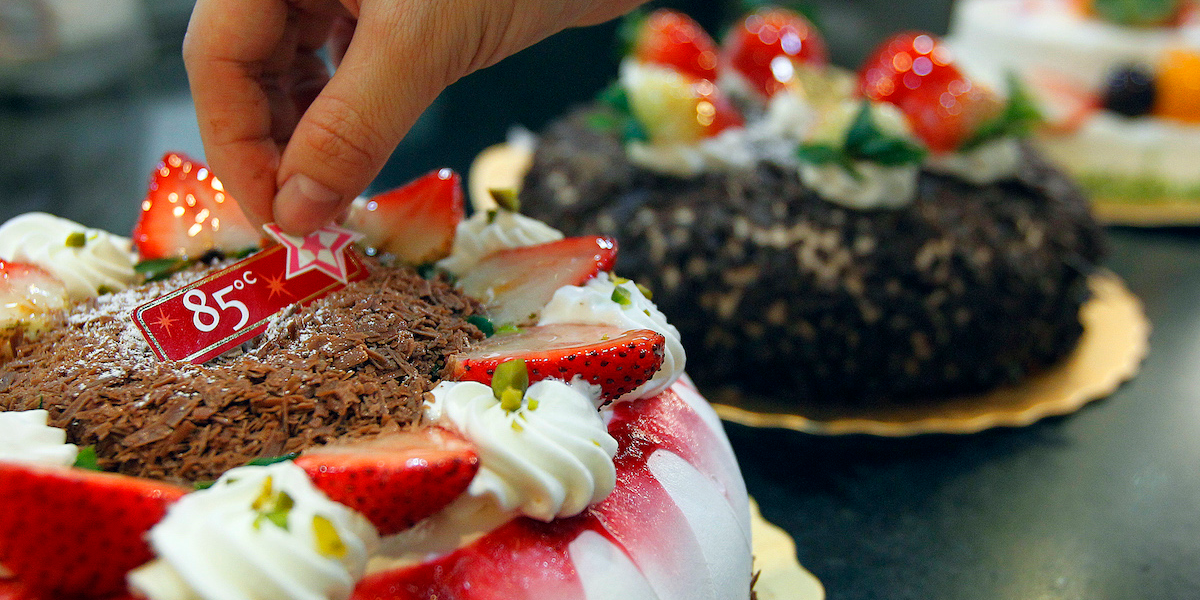- Taiwan President Tsai Ing-wen had a cup of coffee at a Taiwan-owned coffee shop in Los Angeles last Sunday.
- The cafe, 85°C Bakery Cafe, has since received a barrage of attacks from Chinese citizens and state media, who have accused it of supporting Taiwanese independence and undermining China.
- 85C has since declared its support for China’s territorial ambitions, but that wasn’t enough.
- Multiple food delivery companies in mainland China removed 85C’s products from its platforms.
- The share price of 85C’s parent company also plummeted on Thursday, wiping $120 million off its value.
- China has pressured multinational companies over their stance on Taiwan multiple times before.
China is waging war against a bakery-and-coffee chain that served the President of Taiwan coffee during her trip to the US.
85°C Bakery Cafe – known as 85C – has come under attack from Chinese citizens and media after photos emerged of Taiwanese President Tsai Ing-wen at its Los Angeles branch last Sunday.
In the wake of the photos, 85C has been forced to declare its support for China’s territorial ambitions, endured attacks in Chinese state media, and seen its products removed from food delivery apps in mainland China.
Tsai visited 85C during a stop in the US en route to Belize and Paraguay, two of Taiwan’s 18 remaining diplomatic allies. China has pressured other countries to cut diplomatic ties with the island nation.
Tsai Shih-ying, a Taiwanese politician accompanying the president on her trip, posted photographs of their visit on Monday.
Tsai's visit angered many Chinese citizens and authorities, who believe that 85C undermined China and supported Taiwanese independence by serving the Taiwanese president coffee.
The cafe has received dozens of comments on popular Chinese microblogging platform Weibo telling them to "get out of China" in the wake of the visit. Commentators are also encouraging boycotts of the coffee chain in mainland China.
The international cafe chain was opened in Taiwan but has more than 900 branches in mainland China, Taiwan, Hong Kong, California, and Australia. More than 600 are in mainland China alone, according to the South China Morning Post.
The chain responded to the furore on Wednesday, posting on its mainland China site and on Weibo a statement declaring its support for the "1992 Consensus," an ambiguous policy used by Beijing to assert its claim over Taiwan.
85C said: "This company's firm support for the '1992 Consensus' has never changed. This company will also continue pushing toward the peaceful development of the two straits' relations, expand their cooperation, and oppose any words or actions that might divide their familial feelings."
The statement was written in simplified Chinese, the script used in mainland China, rather than in traditional Chinese, which is used in Taiwan.

That didn't appear to be enough, however.
The bakery's products in mainland China were taken off the country's most popular food delivery apps, including Dianping, Meituan, and Alibaba-owned Ele.me, the South China Morning Post reported on Thursday.
The share price of 85C's parent company, Gourmet Master Co., plunged 7.5% in Taiwan on Thursday in response, wiping $120 million off the company's market value, Bloomberg reported.
On Friday, China's state-run tabloid Global Times capitalized on the controversy by reporting that a 85C employees had given Tsai a gift and suggesting that the cafe was providing a platform for Tsai to show her independence.
While one photo appeared to show Tsai receiving a gift from the branch's employees, the bakery has since clarified in a statement that she had been signing a pillow for a staff member instead.
Taiwan's presidential spokesman, Alex Huang, this week condemned Beijing's actions as "not in line with a civilized society" and "disrupting market order and freedom of speech," according to CNN.

This is not the first time Beijing has pressured multinational companies over their stance on Taiwan.
In April, China began demanding that airlines stop listing Taiwan as a sovereign country, and instead describe it as a province of China. Dozens of airlines including American Airlines, United Airlines, and Palau Pacific Airlines have all given in to those demands.
Other companies including Audi, Mariott International, and Zara have also given in to Chinese demands by altering their maps or listing Taiwan as part of China on their websites.
Multiple countries have cut diplomatic ties with Taiwan over recent months. Taiwan blamed the trend on China's "dollar diplomacy" - using foreign aid and investment to pressure economic allies to cut ties.
Beijing has ramped up its pressure on Taiwan since Tsai's pro-independence party came into power in 2016.
Tsai has appeared to push back. According to Reuters, she defiantly said before her flight that "no one can obliterate Taiwan's existence."

